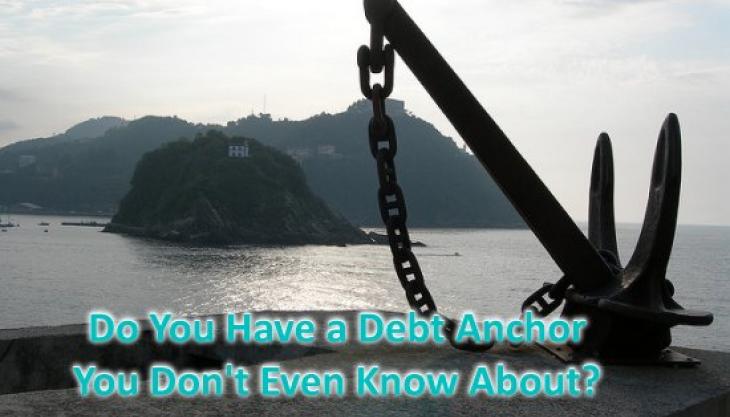What Is Cross-Collateralization And How Can It Wreck Your Finances?
Submitted by Rachel R on Fri, 02/12/2016 - 9:10am

Cross-collateral clauses can be an anchor on your finances
Image Source: Flickr User Urko Dorronsoro
Credit unions can be a great part of your financial plans and offer affordable banking solutions including loans for vehicles, home purchases, and even personal signature loans. They also offer credit cards and a host of other credit solutions. But credit unions also have powerful debt collections tools that you may not be aware of and that can create a hardship if you ever struggle to pay your bills. One of the strongest tools they have at their disposal is cross-collateralization.
What Is Cross-Collateralization?
Typically when you purchase an asset using debt, the loan is collateralized (i.e., secured) by the asset. So, for instance, when you buy a car and get a car loan to finance it, the vehicle itself serves as collateral, which means security, for the debt. This allows the lender recourse if you don’t pay your installments and lessens their risk. The lender can take back the vehicle to encourage you to get caught up on payments – or can sell it to help pay the debt if you don’t repay as promised.
But in some cases, credit unions use cross-collateralization which tethers unsecured debt to assets you have financed. Unsecured debt is debt that’s not attached to an asset - and includes credit cards and personal signature loans. The credit union may include fine print in your financing agreement for your unsecured debt that any assets you have financed through the credit union can be used to secure that debt. This means unrelated debt can be tethered together - like an anchor.
How Can Cross-Collateralization Hurt You?
If your unsecured debt is attached to a secured loan, you may find a lien has been placed on the asset related to the unsecured debt. So, for instance, if you took out a $3,000 unsecured signature loan and also have a car loan through your credit union, they can place a lien for that $3k debt onto the car’s title. This won’t matter so long as you pay the signature loan. But if you can’t make your payments on the signature loan, your car may be repossessed because of the lien for the other loan.
Cross-collateralization is often not disclosed or explained to borrowers and is left unnoticed in the fine print unless and until it becomes a factor. Another way that credit union cross-collateralization can harm you is that it can prevent you from enjoying the full benefits of bankruptcy should you decide you need that level of debt relief. If you file Chapter 7, many of your unsecured debts will be discharged including credit cards, medical bills, some back taxes, and signature loans.
But if you had unsecured debt that was cross-collateralized and the credit union placed a lien on an asset you financed through them, such as a car, here's what happens. The unsecured loan would be wiped out in bankruptcy, but the lien would not and you could be forced to pay off that debt if you ever wanted to sell the vehicle because the lien makes the title non-transferrable.
Consult an Experienced Bankruptcy Attorney for Help Dealing with Cross-Collateralized Debt
The best approach is to avoid a cross-collateral contract, but if you have one, there may be a way around the cross-collateral clause if you address it before filing bankruptcy. If you intend to file Chapter 7, you may be able to refinance the loan or sign a reaffirmation agreement as part of your bankruptcy to end the cross-collateralization. With Chapter 13, you may be able to cram down a vehicle loan to help make up for the lien. Or with either chapter, surrendering the vehicle may be a better option to shed the car loan debt and any associated debt.
If you live in North Carolina, contact the Law Offices of John T. Orcutt to find out more about dealing with credit union debt and other bills you can’t afford to pay. Call +1-833-627-0115 now for a free bankruptcy consultation at one of our convenient locations in Raleigh, Durham, Fayetteville, Wilson, Greensboro or Wilmington.
Debts Hurt! Got debt? Need help? Get started below!
Serving All of North Carolina
- Bankruptcy Attorneys Raleigh NC (North)
- Bankruptcy Attorney Fayetteville NC
- Bankruptcy Attorney Durham NC
- Bankruptcy Attorneys Wilson NC
- Bankruptcy Attorneys Greensboro NC
- Bankruptcy Attorneys Southport NC
- Bankruptcy Attorneys Wilmington NC
Bankruptcy Attorneys Raleigh NC (North)
6616 Six Forks Rd #203 Raleigh, NC 27615 North Carolina
Tel: (919) 847-9750

Bankruptcy Attorney Fayetteville NC
2711 Breezewood Ave Fayetteville, NC 28303 North Carolina
Tel: (910) 323-2972

Bankruptcy Attorney Durham NC
1738 Hillandale Rd Suite D Durham, NC 27705 North Carolina
Tel: (919) 286-1695


Bankruptcy Attorneys Greensboro NC
2100 W Cornwallis Dr. STE O Greensboro, NC 27408 North Carolina
Tel: (336) 542-5993

Bankruptcy Attorneys Southport NC
116 N Howe St. Suite A Southport, NC 28461 North Carolina
Tel: (910) 218-8682

Bankruptcy Attorneys Wilmington NC
116 N. Howe Street, Suite A Southport, NC 28461 North Carolina
Tel: (910) 447-2987
